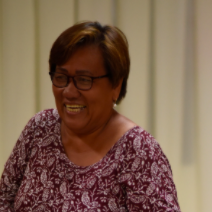

The following is a first-person account by Barangay Captain Filomena Cinco of Sampaloc, Manila, on the state of her community during the coronavirus crisis.
This is Part 1 of a two-part series. Part 2, which you can read here, is an analysis of this account by social anthropologist Mary Racelis.
At first, the community ignored the COVID-19 crisis. Despite messages from the government, they only began to take it seriously after hearing the relentless flood of news coming day and night from TV or radio stations, Youtube, Facebook, Instagram, and other media. This information barrage about COVID-19 made them aware at last of the need for self-quarantine, physical distancing, wearing a mask, avoiding crowded places, and taking other precautionary measures. Barangay officials and local association heads have reinforced the messages and promoted the appropriate behavior.
No positive cases of COVID-19 have been reported, but as of March 20, there were already 3 persons under monitoring (PUM). PUM body temperatures and other symptoms are checked in the morning (8 am) and afternoon (2 pm). Our Barangay Health Emergency Response Team (BHERT) is well-coordinated by Dr. Gerardo Benitez of the M.F. Jhocson Health Center. Since the first 3 PUMs are getting better, they will not be tested but will remain under self-quarantine for 14 days. So far there are no deaths in our barangay.
We know what to do if a person comes out positive within the 14-day quarantine. The BHERT focal person will report that case to the Jhocson Health Center, which will transmit the information to the Health District IV Office and from there to the Manila Health Department. Trained medical people will then pick up the patient in an ambulance going to whichever hospital the LGU has designated as a testing center. Positive confirmation requires the LGU to report the case to the Department of Health for recording.
Meanwhile in the barangay, health team members, who are also local residents, talk to the affected family. Naturally they are worried and frightened. Since the team members know the family, they comfort them and explain honestly the procedures necessary for the patient’s recovery. The other family members are advised to self-quarantine for 14 days. That extends to relatives and friends who may have had close contact with the infected person. PUMs can draw on the barangay services for help in purchasing food, bottled water, or other needed supplies. The barangay staff takes care of those requests, ensuring the items are delivered in timely fashion to the quarantined households.
Looming poverty and hunger
In terms of COVID-19 surveillance, we are prepared. What is causing us real fear though are the many here who have lost their incomes and jobs because of the lockdown. About 90% of the people in Estero are out of work. People are very worried. Where will they get money to buy food, medicine, and other basic necessities? How are they going to pay their water and electricity bills, despite a one-month moratorium? (READ: [ANALYSIS] The Philippine gov't should get cash into the hands of the poor, now)
The community is responding though. Our people are sharing with the poorest families what little they have, like rice and viands. Some women walk around inside the community selling food to their neighbors. The better-off families hire the poorer ones to do household chores, like cleaning, washing and ironing. In addition, our community service program gives them a chance to run errands and in exchange receive rice and money.
Yet, those options provide very minimal income for their family. Some alumnae of Pamantasan Lungsod ng Maynila (PLM) came and commissioned our sewers to make improvised face shields and masks as well as surgical gowns. These young professionals will soon be donating their products to medical frontliners. The sewers are happy not only to be earning reasonable amounts but proud to be part of these young people’s noble efforts. Because of the close ties developed over the years through a strong People’s Organization (PO) and a responsive Barangay, Estero residents know they can rely on one another in good times and bad.
The city mayor, vice mayor, and councilors give frontline workers like us special attention with bottled water, drinks, bread and biscuits, noodles, food packs, medical kits, and health equipment. Private individuals and business establishments within our jurisdiction have brought similar donations. Mayor Isko Moreno contributed two thermal scanners. When the City of Manila declared a state of calamity, that allowed the barangay “in aid of legislation” to utilize our Disaster Recovery Funds to purchase and distribute rice as food subsidies.
Even before the Enhanced Community Quarantine (ECQ), the barangay distributed face masks, alcohol, sanitizer, and hand soap The City of Manila and its Department of Social Welfare have provided food packs and rice subsidies. Our Lady of Loreto Parish and Kaya Natin Movement through Urban Poor Associates will be delivering food packs and rice. We have submitted our household master list to them so that they can move fast to procure and circulate the identified urgently needed goods. Let’s hope these reach our community the soonest possible.
With all this what message would our community want to convey to the President?
Their voices are loud and clear: President Duterte! Make sure that food packs, rice subsidies, or any help at all for our families reach us soon. We will not die from COVID-19 but from hunger! – Rappler.com
Filomena Cinco is Captain of Barangay 412 Zone 42 District IV, Sampaloc, Manila.